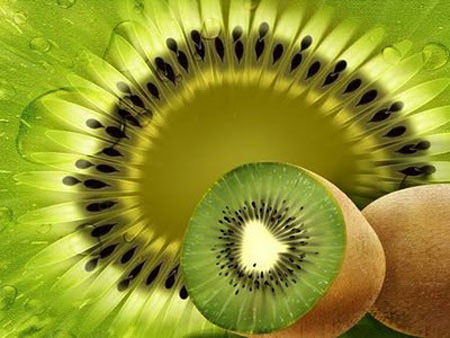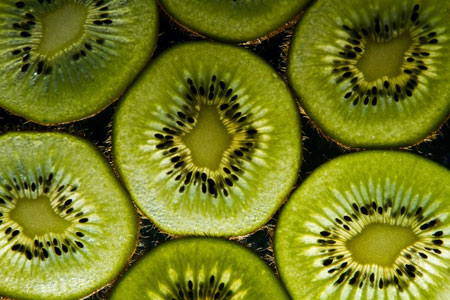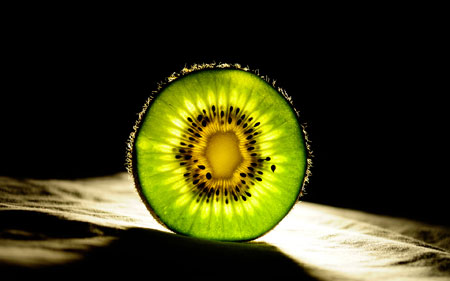Kiwi fiber protects against diabetes, heart disease, and fight against cell aging. Kiwi fruits have undeniable healing properties. At least 10 diseases can be kept away if we eat kiwi fruit daily. Who needs a kiwi? Anyone, because, apart from the qualities of healing, this fruit has a proven role in preventing various diseases. So, no day without kiwi, and we’ll keep our body healthy, without worries.
All the minerals in a single fruit
According to recent studies, kiwi fruit contains most nutrients. For instance, it contains more vitamin C than an orange. It is rich in lutein, a substance more increasingly appreciated for its effectiveness in reducing risk of cancer, heart disease and preventing cataracts.
Kiwi is considered to be a corn, a fruit with the richest source of lutein. Copper mineral has a vital role in the growth of children because it helps strengthen the bones, brain development and immune system. We find plenty of copper in kiwi fruits. It also contains potassium, more than bananas. This element helps the efficient functioning of the heart and blood pressure control. Other minerals found in this green fruit: sour magnesium, iron, calcium, vitamin E, B6, C, folic acid, magnesium, chromium, potassium. Remember that kiwi seeds are those holding all the nutrients: protein, vitamins, minerals.
Kiwi protects against colon cancer
Kiwi fruit is known as Chinese gooseberry, because they are from China and Americans did not discover kiwi until the ’60s. The name kiwi was given from New Zealand bird of the same name, whose residents say that they resemble its feathers. Although, at a first glance this fruit does not seem too appealing, it is very delicious. In kiwi, we find all types of fiber that protects against cardiovascular disease and diabetes. It helps cleanse the colon of toxins, and reduce the risk of developing colon cancer.
It lowers cholesterol levels, leading implicitly to reduce the risk of a heart attack or stroke. Consumption of several kiwis a day reduces the risk of blood clots and the amount of fat (triglycerides) in blood. Is having the same effect as aspirin, but it does not cause ulcers. In addition, kiwi is not fattening, on the contrary, it is recommended in many weight loss diets. Although it is rich in nutrients, a kiwi fruit has only 45 calories and is ideal in cases of obesity.
Useful in diseases of the skin and eyes
Kiwi protects the airways due to its high content of vitamin C. It prevents atherosclerosis and arthritis and strengthens the immune system. A study by Italian experts shows that asthma symptoms are rarely encountered in children who eat between 5 and 7 citrus fruits a week, including kiwi. Kiwi is good for the eyes: It helps the body fight against eye degeneration. It exceeds even the efficiency of well-known carrots.
Ophthalmologists have found that eating three or more kiwi fruits per day, the risk of eye degeneration decreases by 36%. Phytonutrients in kiwi protect our DNA. This fruit has fascinated scientists with its ability to protect DNA from free radical bombardment. Kiwi is also an important source of antioxidants, substances that delay cell aging. In terms of antioxidant content, kiwi ranks third, after the orange and grape. The content of vitamin E and A contribute to skin health and healing of wounds and certain skin diseases.
Kiwi cure
There is no reason to bypass this fruit. The only problem is that, like strawberries, kiwi can cause allergic reactions to certain people, especially in children prone to allergies. This fruit is not recommended for patients with kidney disease, because they contain oxalates, which can crystallize substances.
If you want to do a cure with kiwi, you should eat for two weeks, about a quarter of a kilogram of kiwifruit per day. You can eat them in the morning, before or even during the meal, mixed with a little cottage cheese. The fruit is consumed fresh, cut in half and eaten directly from the shell using a spoon, as eggs. It can also be used in cosmetics, skin maintenance, applying kiwi slices for 15-20 minutes. This method helps to prevent wrinkles, improves skin tone and smoothness the skin.
A fresh fruit even after two weeks
If the fruit is ripe and soft to the touch, should be kept cold. Moisture is important for kiwi fruit unless eaten immediately, it is advisable to keep it in a plastic bag. Kiwi does not alter about 2-3 weeks after purchase, or even more if we keep them in the refrigerator. Do not place kiwi next to other fruits or vegetables, or in direct light rays from the sun.



